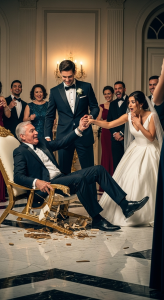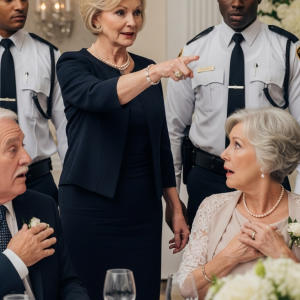At my daughter’s wedding, her fiancé, Jasper, pulled out a gilded chair for me with a grand, theatrical flourish. But the moment my weight settled, a sharp crack echoed through the reception hall. The chair splintered beneath me, and I hit the polished marble floor with a heavy, undignified thud. A wave of laughter, sharp and cruel, rippled through the lavishly dressed guests.

Looming over me, Jasper didn’t offer a hand. He offered a sneer, his handsome face contorted into a mask of pure contempt. “That’s exactly where you should be,” he said, his voice loud enough for everyone to hear. As I struggled to rise, my pride burning hotter than any physical pain, a new voice cut through the mockery. The groom’s own father was staring at me, his eyes wide with a look of stunned disbelief. “Sir…” he whispered, his voice trembling slightly. “Is that really you?”
Those words were a key, unlocking a door to a past I had welded shut decades ago. But to understand the weight of that moment, you must first understand the four months of quiet warfare that led to it.
It began on a frigid January afternoon. The cold of a Brooklyn winter seeped through the concrete walls of my garage, a place that had been my sanctuary for thirty years. I was coaxing life back into the engine of an old Harley-Davidson, my hands, gnarled and permanently stained with the ghost of a thousand repairs, moving with a familiar, practiced grace. The air was thick with the scent of motor oil and steel—the perfume of honest work.
The rumble of an unfamiliar luxury car pulled up outside, followed by the sound of hurried, excited footsteps on the gravel. “Dad!” Vivian burst through the side door, her cheeks flushed pink from the cold, her whole body practically vibrating with an energy I hadn’t seen since she was a little girl waiting for Santa Claus.
I looked up from the engine block, wiping my hands on an old rag that was more grease than fabric. “What’s the fire, sweetheart? You look like you just won the lottery.”
She thrust her left hand forward, her eyes sparkling with a brilliance that outshone the massive diamond now occupying her ring finger. “It’s better than the lottery! Jasper proposed! Dad, I said yes!” She practically shoved her phone into my face, eager for me to witness the moment.
The video showed a scene from another world. A Michelin-star restaurant, all dark wood and glistening chandeliers. Jasper, immaculate in a tailored suit that probably cost more than my truck, was on one knee, holding up the ring. Vivian was radiant, her face a perfect portrait of joy as she tearfully accepted, followed by a chorus of applause from the surrounding diners.
I forced a smile, the muscles in my face feeling stiff and unnatural. “He did good, princess. It’s a beautiful ring.” But as I replayed the short clip, my mechanic’s eye, trained to spot the smallest imperfection, caught something. After sliding the ring onto Vivian’s finger, Jasper turned and waved a waitress away with a sharp, dismissive flick of his wrist. His charming smile snapped back into place a second later, but I had seen the flash of ice in his eyes. I had seen enough to feel a cold knot of unease tighten in my gut.
“I’m happy for you, Viv,” I said, my voice steadier than I felt. “When do I get to meet this guy’s parents?”
“Oh, they’re on a two-month cruise in Europe,” she replied, her words rushed. “A last-minute thing. But we’re not waiting! We’re planning the wedding for April. Jasper says when you know, you know. Isn’t it romantic?”
I nodded, the knot in my stomach coiling tighter. That night, long after Vivian had driven off in her new fiancé’s car, I sat in my small, cluttered office. The gentle, smiling face of my late wife, Maria, watched me from a silver frame on the desk. “She’s so happy, Maria,” I whispered to the photograph. “But this guy… something isn’t right. Help me protect our girl.”
My search for Jasper Thorne online began with a simple query. His social media profiles painted a picture of meticulously curated success. There were photos of him leaning against sports cars I knew for a fact cost a quarter of a million dollars, close-ups of luxury watches on his wrist, and endless snapshots of him and his friends at exclusive clubs and glamorous restaurants.
It wasn’t the money that bothered me. I had worked for rich people my whole life. It was the suffocating arrogance that bled through every post. His captions were filled with thinly veiled contempt for “the old generation” and “outdated traditions,” while glorifying a cutthroat ambition that left no room for loyalty or honor.
Then, I found it. A photo of him and Vivian, taken a week after the proposal. They were standing on a balcony overlooking the city skyline, champagne flutes in hand. The caption read: Upgrading my lifestyle one smart choice at a time.
My blood ran cold. I scrolled through the comments from his wealthy friends, a stream of congratulations and back-slapping. One comment stood out: Who’s the girl, J? She looks different from your usual type.
Jasper’s reply was a punch to the gut: “She’s perfect. Sweet, incredibly trusting, and her father’s exactly the kind of simple man who won’t get in the way.”
Simple man. The words echoed in the silence of my office. My fists tightened until my knuckles were white. These hands, scarred and calloused from decades of hard, honest labor, were the same hands that had built Vivian’s childhood home from the ground up. They had assembled her first bicycle, built her a treehouse in the old oak tree, and held her tight after Maria passed away. I had worked double shifts for ten years to pay for her college education, ensuring she had a world of choices I never did.
And to this arrogant, silver-spooned child, I was just a “simple man.” An obstacle so insignificant it wasn’t even worth considering.
We finally arranged to meet Jasper for dinner at a place he chose, an absurdly expensive restaurant in Manhattan called ‘The Golden Fork.’ The moment I stepped through the revolving doors, I felt like a man who had wandered into the wrong country without a passport. The air was perfumed and hushed, the floors were gleaming marble, and chandeliers dripped with enough crystal to pay off my mortgage.
Jasper and Vivian were already seated at a corner table. He rose slowly, almost reluctantly, only after Vivian gestured enthusiastically in my direction. His handshake was limp and brief, his smile a thin, practiced curve that didn’t reach his eyes.
“Mr. Reyes,” he said, his voice as smooth as the wine he was drinking. “Vivian has told me so much about you. She tells me you work with your hands. That must be… quaint.”
“I’m a mechanic,” I replied, my voice level. “I fix what’s broken.” My eyes met his, and I hoped he understood my meaning went far beyond cars.
“How wonderfully refreshing,” he said, his hollow laugh grating on my nerves.
The dinner was a masterclass in subtle humiliation. He referred to my Brooklyn neighborhood as “authentically working-class,” as if he were a tourist describing an exhibit at a zoo. He launched into a long, boring monologue about “smart investments” and “leveraging assets,” all while swirling a glass of wine that cost more than my weekly grocery bill.
“You see, Mr. Reyes,” he explained, leaning forward conspiratorially but looking directly at Vivian, “your father’s generation believes in abstract concepts like loyalty and hard work. My generation believes in efficiency. Why break your back for forty years when your money can do the work for you in four?”
Vivian shifted uncomfortably in her seat, forcing a tight smile. She was caught in the crossfire, and it was killing me to see it. I remained silent, letting him talk, letting him expose the rot at his core with every smug, self-satisfied word.
When the bill arrived, presented on a small silver tray, Jasper made a show of looking at it before sliding it pointedly across the table toward me. “Tradition,” he said with a magnanimous air, “dictates that the bride’s father takes care of the check.”
The total was $362.48. For me, that was nearly a full week’s earnings. My jaw tightened, but I pulled out my worn leather wallet and placed my credit card on the tray, refusing to give him the satisfaction of seeing me hesitate. As the waiter walked away, I caught Vivian’s expression. It was a mixture of embarrassment and a dawning, troubled awareness. She was finally starting to see.
Later, as we waited for the valet to bring our cars, I pulled her aside. “Sweetheart,” I said gently. “That wasn’t a dinner. That was a performance. A man who loves you doesn’t try to humiliate your father.”
She bit her lip, refusing to meet my eyes. “Maybe he was just nervous, Dad. He’s not used to… you know.”
“No,” I said, my voice soft but firm. “That wasn’t nerves, Viv. That was cruelty. He’s testing you. He’s seeing how much you’ll let him get away with.” I could see the conflict in her eyes, the desperate desire to believe in the fairy tale she had built in her mind.
Despite my warnings, despite the growing collection of red flags, the wedding went ahead. As I walked Vivian down the aisle, she was breathtakingly beautiful in her white gown, her face alight with a fragile, hopeful joy. Looking at her, I felt a familiar pang of love and a fresh wave of fear. I prayed to Maria that I was wrong. I prayed Jasper would, for this one day, treat my daughter with the respect she deserved.
The reception was held in a magnificent ballroom with ceilings so high they seemed to touch the sky. Champagne flowed like water, and the air buzzed with the laughter and chatter of the city’s elite. I tried to make myself small, to blend into the background, content to be a silent observer of my daughter’s happiness.
But Jasper, it seemed, couldn’t resist one last public display of dominance.
“Mr. Reyes!” he called out, his voice booming across the dance floor. He gestured toward an empty chair at the main table. “Come, join us! Take a seat!”
Every head turned. The music softened. I felt a hundred pairs of eyes on me as I made my way toward the table, my steps heavy. I gave a polite nod and moved to sit down. As I lowered myself, I felt the chair suddenly jerk backward, pulled by an unseen force. My balance gone, my hands flailing for something to grab, I crashed to the floor.
A collective gasp, followed by a smattering of nervous, then open, laughter. The sound was deafening. My face burned with a humiliation so profound it felt like a physical fire.
And there was Jasper, standing over me, the architect of my fall, a triumphant smirk playing on his lips. “Perhaps you’re more comfortable on the floor,” he sneered. “After all, that’s where you belong.”
Vivian cried out his name, her voice a mixture of shock and horror. She rushed forward to help me, but before I could even begin to push myself up, a deep, resonant voice cut through the noise, silencing the room instantly.
“Sir… is that really you?”
I looked up, my vision blurry with anger. Standing beside Jasper, his face pale and his eyes wide with utter astonishment, was the groom’s father, Mr. Thorne. He took a hesitant step toward me, completely ignoring his own son. “Sergeant Reyes?” he breathed, the name hanging in the air like a ghost. “Sir… my God… it is you, isn’t it?”
The room fell into a stunned, absolute silence. The guests stared, their faces a canvas of confusion. Jasper’s smirk dissolved, replaced by a slack-jawed bewilderment.
You see, there was a lifetime I lived before the garage, before Maria, before Vivian. A lifetime I never spoke of, whose memories I kept locked away like old war medals in a dusty box. In that life, I wasn’t Arturo the mechanic. I was Sergeant Arturo Reyes of the U.S. Army. I had led men through hell and back. I had saved lives and taken them. I carried scars, both inside and out, that no one in this room could ever comprehend.
This was a chapter I had deliberately kept closed. I wanted Vivian to have a normal life, untouched by the shadows of my past. She knew I had served, but she didn’t know the details. She didn’t know about the commendations, the firefights, the men who looked to me to keep them alive.
But Jasper’s father, Harrison Thorne, had been one of those men. A young, terrified private in my unit, thirty years ago. He remembered. And now, in this ballroom filled with people who had just laughed at my fall, he called me by a name that held more weight and honor than any in the room. He didn’t see a “simple man.” He saw the Sergeant who had saved his life.
The silence finally broke, fracturing into a flurry of hushed, urgent whispers. Vivian’s gaze darted between me, her new husband, and her father-in-law, a storm of realization dawning in her eyes. Jasper, for the first time in his life, was speechless. His arrogance was a shield, and for once, it had been shattered.
Ignoring his son completely, Harrison Thorne reached down and offered me his hand, pulling me to my feet with a strength born of deep respect. He then grasped my hand in a firm, emotional handshake. “It is an honor, Sergeant,” he said, his voice ringing with authority, loud enough for every person in the hall to hear. “This man saved my life. This man deserves our respect.”
The atmosphere in the room shifted instantly. The last remnants of laughter curdled into a thick, awkward silence, which then morphed into a palpable sense of collective guilt. Eyes that had been filled with mockery moments before now looked away in shame.
And Vivian’s eyes, my beautiful daughter’s eyes, filled with tears. Not tears of sadness for my humiliation, but tears of overwhelming pride. She finally saw me. Not as the simple mechanic Jasper wanted her to see, but as the man I truly was
That wedding reception was the beginning of the end. The marriage, built on a foundation of lies and disrespect, didn’t last six months. Away from Jasper’s influence, Vivian began to see him for the shallow, cruel man he was. The incident at the wedding was a crack in the facade that quickly spiderwebbed, revealing the emptiness within.
She came home one rainy evening, looking small and broken, her suitcases in the trunk of her car. She walked into my arms in the familiar quiet of our small living room. “Dad,” she whispered, her voice choked with tears, “you were right about everything. I just… I didn’t want to see it.”
I held her tight, stroking her hair just as I did when she was a child. “You have nothing to be sorry for,” I told her, my own voice thick with emotion. “You just need to be free. Welcome home.”
In that moment, I felt Maria’s presence beside us, a warm and comforting spirit, proud of the daughter we had raised and the man I had tried to be.
That day at the wedding, Jasper tried to put me on the floor to prove a point about my station in life. He wanted to show everyone that I was beneath him. But life has a funny way of revealing a person’s true measure. I wasn’t just a mechanic in greasy overalls. I was a father. A protector. And once, a long time ago, I was a soldier who had fought for things far more valuable than money or status.
Jasper’s wealth could buy him luxury, but it could never buy him honor. And no amount of arrogance, no cheap trick with a broken chair, could ever take that away from me.




